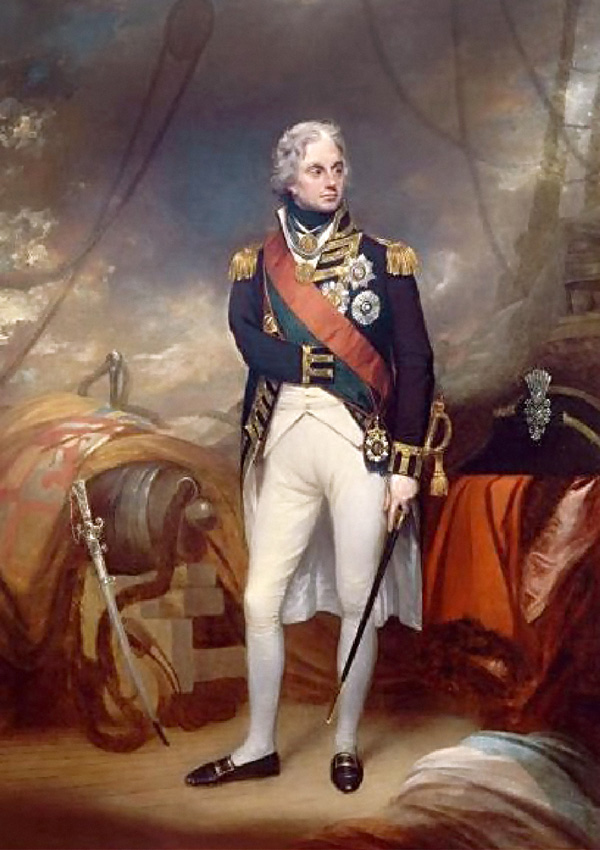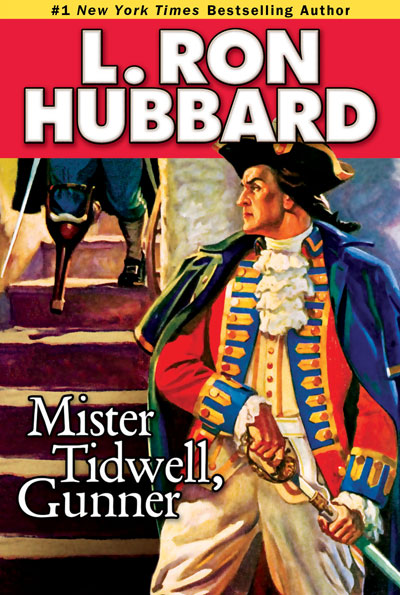Little Known Facts from Mister Tidwell, Gunner
L. Ron Hubbardʼs historical fiction included little-known facts. He did meticulous research that added authenticity to his stories and, in his own words, he tried “harder to make every word live and breathe.”
These historical facts are inspired by Mister Tidwell, Gunner—a war story of an unlikely hero during the naval battles of the 18th century under the command of Lord Nelson.
 Lord Horatio Nelson (1758–1805) was a British naval commander, a national hero, and one of the greatest military leaders of all time. He is most famous for victories over the French during the Napoleonic Wars.
Lord Horatio Nelson (1758–1805) was a British naval commander, a national hero, and one of the greatest military leaders of all time. He is most famous for victories over the French during the Napoleonic Wars.
Born on 29 September 1758 in Norfolk, England, Horatio Nelson was the 6th of 11 children to a clergyman.
At the age of 12, he joined the British Royal Navy with a ship commanded by his uncle.
Nelson rose rapidly through the ranks. In 1778, at the age of 20, he obtained his own command.
In 1798, he destroyed Napoleon’s fleet at the Battle of the Nile.
During this battle, the L’Orient, a 118-gun flagship of the French fleet, caught fire and eventually exploded. This defeat was the end of France’s bid for a direct trade route to India.
Mister Tidwell, Gunner is based on a true story—the real history of this battle.
Lord Nelson was known for bold action and the occasional disregard of orders.
He was second in command at the siege of Copenhagen (1801).
When ordered to withdraw, he pretended not to see the flagship’s signals to do so.
He turned to his flag captain (Thomas Foley) and said:
“You know, Foley, I only have one eye—I have the right to be blind sometimes.”
Then with his telescope held to his blind eye, he said:
“I really do not see the signal to withdraw.”
Today we still use Lord Nelson’s expression “to turn a blind eye” when we choose to ignore a fact.

His most famous engagement (Cape Trafalgar) prevented any future invasion by Napoleon, but it was also Nelsonʼs last battle.
He was mortally wounded and died as victory was declared.
Mister Tidwell, Gunner—The Story
 Mister Tidwell is a scholarly Oxford professor snatched out of his bookish world and pressed into service aboard Lord Nelson’s legendary British fleet—as the ship’s schoolmaster.
Mister Tidwell is a scholarly Oxford professor snatched out of his bookish world and pressed into service aboard Lord Nelson’s legendary British fleet—as the ship’s schoolmaster.
Such is the life of the land-loving, seafaring Mister Tidwell, Gunner.
Thrust into service at the height of the Napoleonic Wars, Tidwell soon finds himself directly in the line of fire and way out of his depth.
Fate has cast him into a terrible and terrifying spot—alone on deck to face the fearsome approach of a French man-o’-war.
The professor is about to get an object lesson in war, self-reliance … and survival.
Overwhelmed by the smell of gunpowder, the sound of cannons, and the sight of death, he will either experience the sweet taste of victory … or the bitter taste of his own blood.
The Story Behind the Story
In L. Ron Hubbard’s essay Search for Research, he discussed generating story ideas and the origin of his story, Mister Tidwell, Gunner.
“I began to search for research on the theory that if I could get a glimmering of anything lying beyond a certain horizon, I could go deep enough to find an excellent story.…
“On this plan I began to read exhaustively in old technical books, ancient travel books, forgotten literature. But not with the idea of cribbing. I wanted information and nothing else. I wanted to know how the people used to think here, how the land lay there. Given one slim fact for a background, I have found it easy to take off down the channel of research and canal-boat out a cargo of stories.
“In other words, I have no use for an obvious story idea as laid out in Popular Mechanics or Forensic Medicine. I want one slim, forgotten fact. From there a man can go anywhere and the story is very likely to prove unusual.
“In one old volume, for instance, I discovered that there was such a thing as a schoolmaster aboard Nelson’s ships of the line.
“That was a weird one. Why should Nelson want a schoolmaster?
“Answer: Midshipmen.
“When did this occur?
“Answer: The Napoleonic Wars.
“Ah, now we’ll find out how those old ships looked. We’ll discover how they fought, what they did.
“And there was the schoolmaster during battle. Where? In the ‘cockpit’ helping hack off arms and legs.
“Next lead indicated: Surgery during the Napoleonic Wars.
“Wild guess in another allied field: Gunnery.
“Again: Nelson.
“A battle: On the Nile.
“A ship or something strange about this battle: L’Orient, monster French flagship which mysteriously caught fire and blew up, throwing the weight of guns to Nelson.
“Incidental discovery: ‘The Boy Stood on the Burning Deck’ was written about the son of L’Orient’s skipper.
“Back to midshipmen, the King’s Letter Boys: They were hell on wheels, arrogant, ghastly urchins being trained as officers.
“And with all this under my mental belt, I girded up my mental loins. Complete after a few days of search, I had ‘Mister Tidwell, Gunner,’ which appeared in Adventure.
“All that because I chanced to find there was a schoolmaster aboard Nelson’s ships of the line.”
If you are not familiar with L. Ron Hubbard’s sea adventures or military stories, you can read the page-turner The Phantom Patrol as our gift to you (free eBook download).
Critical Acclaim
“Each of these outstanding audiobooks are two-hour productions characterized by talented multi-cast performances, which are enhanced with impressive special effects and thematic music.
“Flawless technical recordings, each and every one of these very special audiobooks provide the listener with a true ʻtheatre of the mindʼ experience and is enthusiastically recommended for personal and community library audiobook collections.” —Midwest Book Review
“While many pulp writers worked in multiple genres, including Gibson and Dent, the majority of them focused on one or two specific genres, solidifying their careers in that genre in which they felt more comfortable.
“L. Ron Hubbard, on the other hand, tackled a variety of genres and produced a now legendary output of stories in every major (and minor) genre.
“He wrote Westerns, swashbucklers, air adventure, mysteries, espionage thrillers, science fiction, fantasy, tales of the Orient, sea tales, and even Yukon tales in the tradition of Jack London.” —Antique Trader Magazine
Listen to This Excerpt of the Audiobook
This is not just any audiobook, but a cinematic high-definition audio experience brought to life by Hollywood actors.
Sail into history and into battle as the audio version of Mister Tidwell, Gunner takes you into the heart of one of the greatest wars for dominance of the seas.
Other articles and resources you may be interested in:
For more information about Lord Nelson visit Historynet and the Royal Navy sites.
If you are new to L. Ron Hubbard’s fiction, start here.
Learn about L. Ron Hubbardʼs historical fiction
Little known facts and the Pan Am Clipper Seaplanes
Other Military Fiction Stories:
Hell’s Legionnaire, The Falcon Killer, Fifty-Fifty O’Brien, The Green God, Hostage to Death, The Lieutenant Takes the Sky, On Blazing Wings, Orders Is Orders, The Phantom Patrol, Red Death Over China, Sabotage in the Sky, Trick Soldier, While Bugles Blow!, and Wind Gone Mad
Other Historical Fiction Stories:
Sky Birds Dare, All Frontiers are Jealous, Arctic Wings, The Battling Pilot, The Dive Bomber, Hurtling Wings, Inky Odds, Man-Killers of the Air, The Sky-Crasher, Tomb of the Ten Thousand Dead, Trouble on His Wings, Twenty Fathoms Down, Under the Black Ensign, and Yukon Madness
Leave a Reply
Want to join the discussion?Feel free to contribute!


Very complete with sample. Excellent sales tool it seems to me
Thanks, Bruce.